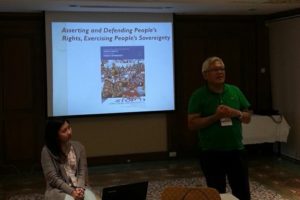IBON International Updates
UNDCF HLS, No. 1
Shaping global accountability in development cooperation
Berlin, 22 March – How should an accountable and effective development cooperation look like in the new global development agenda that is being shaped? Various actors in the international development community participating in the just concluded Germany High-Level Symposium of the United Nations Development Cooperation Forum (DCF) strived to contribute different, and sometimes conflicting, perspectives in this course-setting event.
The symposium held in Berlin from March 20 to 21 is a preparatory meeting for the 2014 DCF to be held in New York in July. It built on conclusions from preceding symposia in Ethiopia and Switzerland and facilitated dialogue with high-level representatives from developing and developed countries, civil society, philanthropic foundations, the private sector, parliamentarians, local governments, and international organizations. Its objective was to examine key concepts of accountability, quality and effectiveness in development cooperation, and how these could be featured in the design and implementation of the post-2015 development agenda.
In his opening statement, Hans-Joachim Fuchtel, Parliamentary State Secretary to the German Minister for Economic Cooperation and Development, stressed: “We want a new global development partnership in which every nation and every player takes a share of the responsibility in accordance with its means.”
A number of civil society representatives participated in the symposium, bringing with them key messages on the critical need for state accountability to citizens, democratic ownership and inclusiveness, transparency and accessibility and usefulness of information, and common but differentiated responsibilities of developed and developing countries. CSOs believed a global accountability mechanism must be based on human rights obligations and make use of existing human rights monitoring mechanisms as well as recognize agreed principles such as those emerging from the Busan Partnership on Effective Development Cooperation and the Istanbul Principles on CSO Development Effectiveness.
IBON International prepared a policy brief on CSO accountability for the DCF that underscored the primacy of accountability to people, especially the poor and marginalized, whom they serve. It asserts that CSO space and capacities for improving the effectiveness of their development cooperation are closely related to country contexts, underlining the need for an enabling environment for CSOs. (The policy brief on “Civil society accountability: To whom and for whom?” is available at https://www.un.org/en/ecosoc/newfunct/pdf13/dcf_germany_policy_brief_2_cso_accountability.pdf)
While there is recognition for the valuable contributions of different players in development cooperation, there remains a debate about the global accountability architecture being primarily inter-governmental. CSO Partnership for Development Effectiveness (CPDE) Co-Chair Antonio Tujan interrogated such view and pointed out that what makes the Global Partnership for Effective Development Cooperation (GPEDC) more advanced than UN processes such as the DCF is the recognition of the premises that principles of effectiveness and democratic processes operate for every development actor.
Towards the end of the symposium, Under-Secretary-General for Economic and Social Affairs of the UN Department for Economic and Social Affairs, Wu Hongbo, outlined the key features of an envisioned global accountability mechanism on development cooperation. He said that such mechanism should go beyond official development assistance, and must address global challenges and policy coherence. It should also consult all actors, from the grassroots upwards. It should be simple, focused and build on existing reporting mechanisms. Moreover, it should feature multiple accountability frameworks looking at both quantity and quality of as well as advance the impact of development cooperation.
Hongbo also emphasized the need for better availability of data, which should be simple, comprehensible and usable to ordinary citizens. Aside from knowledge sharing, knowledge management is also important and currently missing in development cooperation. He also acknowledged the synergies of the DCF and the GPEDC and the expectation for the 2014 DCF to include the full range of development cooperation actors as it aims to serve as a platform for the discussion on the post-2015 agenda, its design and implementation. ###

![[EVENT] From Duterte to Marcos, Jr.: The implications of the United Nations Review on the Philippines](https://iboninternational.org/wp-content/uploads/2022/09/EN-UPR-Infoavond1024_1-300x200.jpg)
